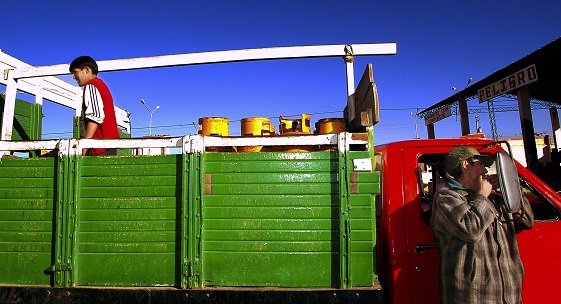
Gas plant workers in El Alto, near La Paz, Bolivia: greater private investment will help the country boost growth, says the IMF (photo: Christian Lombardi/ZUMAPRESS/Newscom)
Bolivia: Living With Low Commodity Prices
December 22, 2016
- Growth expected to remain strong, but imbalances growing
- Key policy priorities: bringing down fiscal deficit, greater exchange rate flexibility
- Increasing private investment vital to boost future growth
After a decade of substantial economic and social progress—supported by sound economic policies—Bolivia is being challenged by low commodity prices.
Related Links
While the country’s economic growth remains among the highest in Latin America, it has slowed recently. In an interview, Ravi Balakrishnan, IMF mission chief for Bolivia, noted that the end of the commodity boom would have a significant effect on Bolivia and encouraged the government to adjust policies gradually to support strong and durable growth.
IMF News: Energy prices seem to have stabilized but continue to be low. How is that affecting the outlook for Bolivia?
Balakrishnan: As one of the most commodity-dependent countries in Latin America, Bolivia has suffered a significant decline in its terms of trade over the past few years. And the expected period of low commodity prices over the medium term will likely lower potential growth, as has been the case for many countries once their commodity booms ended.
This may make it difficult to achieve the government’s development objectives, including eradication of extreme poverty and better access to health and education. To achieve these objectives, the government is scaling up public investment projects to sustain high growth. But, as a result, the sizable fiscal and external current account surpluses generated over a decade have now turned into large twin deficits.
IMF News: What should the government do to address these imbalances?
Balakrishnan: The fiscal deficit reached 6.9 percent of GDP in 2015 due to sharply lower hydrocarbon revenues and large increases in spending, although public debt remains moderate. The current account registered a deficit of 5.8 percent of GDP in 2015. While declining, reserves remain substantial at about 32 percent of GDP.
Given low commodity prices, the overarching priority is to adapt policies to secure strong, balanced, and durable growth; continue to reduce poverty; and guard against risks. With still large buffers, reflecting careful macroeconomic management during the commodity boom, the government can take a measured approach to the timing and sequencing of reforms. Key priorities include steadily reducing the non-hydrocarbons primary deficit and ensuring the financial health of state-owned enterprises, allowing greater exchange rate flexibility, improving incentives for hydrocarbons exploration, and bringing wage growth in line with changes in productivity.
IMF News: How should the authorities go about those priority reforms and preserve the important social gains made in the recent past?
Balakrishnan: As discussed above, the large buffers allow the government to take a gradual approach, but the process should start soon. And, despite likely lower fiscal revenues, the tremendous social gains of the last decade—including the poverty ratio declining by a third to less than 40 percent—can be preserved by improving the targeting and efficiency of social spending. Appropriate measures could include building capacity to make sure that benefits go to those that need them the most and introducing more competition in the provision of social services.
IMF News: Taking a longer-term perspective, what should Bolivia do to raise growth?
Balakrishnan: Increasing private investment is key to improving medium-term prospects. Part of this relates to the hydrocarbons sector. The new hydrocarbon incentives law of December 2015 provides incentives for crude oil and condensates production, and is likely to stimulate more production from existing fields. However, further efforts should be made to increase incentives for exploration investment. The current effective tax burden is likely a deterrent.
More generally, moderating wage growth to prevent increases in labor costs beyond productivity gains and eliminating distortionary policies in product markets would improve private sector participation and efficiency. The short horizon of current proven reserves of natural gas adds to the urgency of improving the business climate and governance, something that is key to further developing non-commodity sectors.


